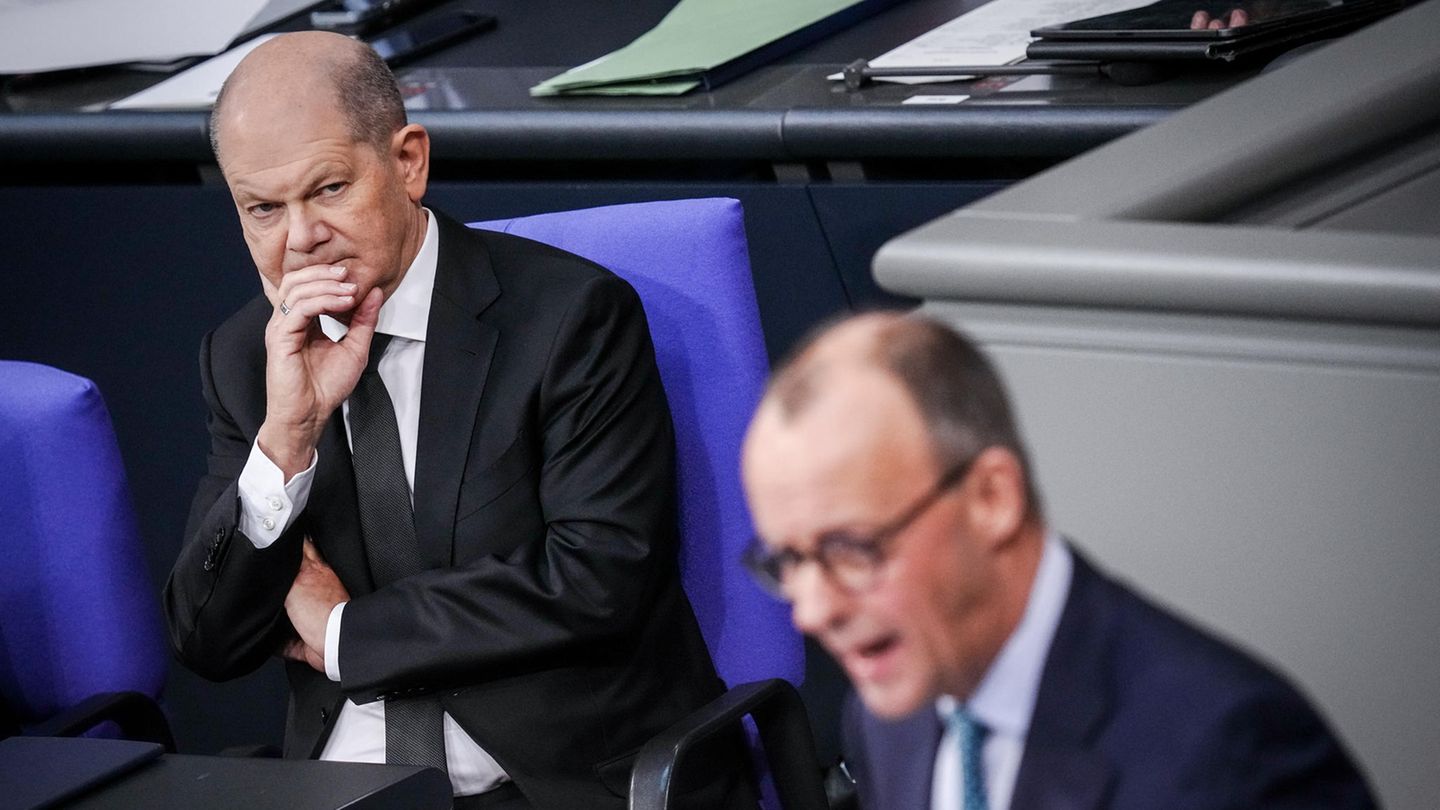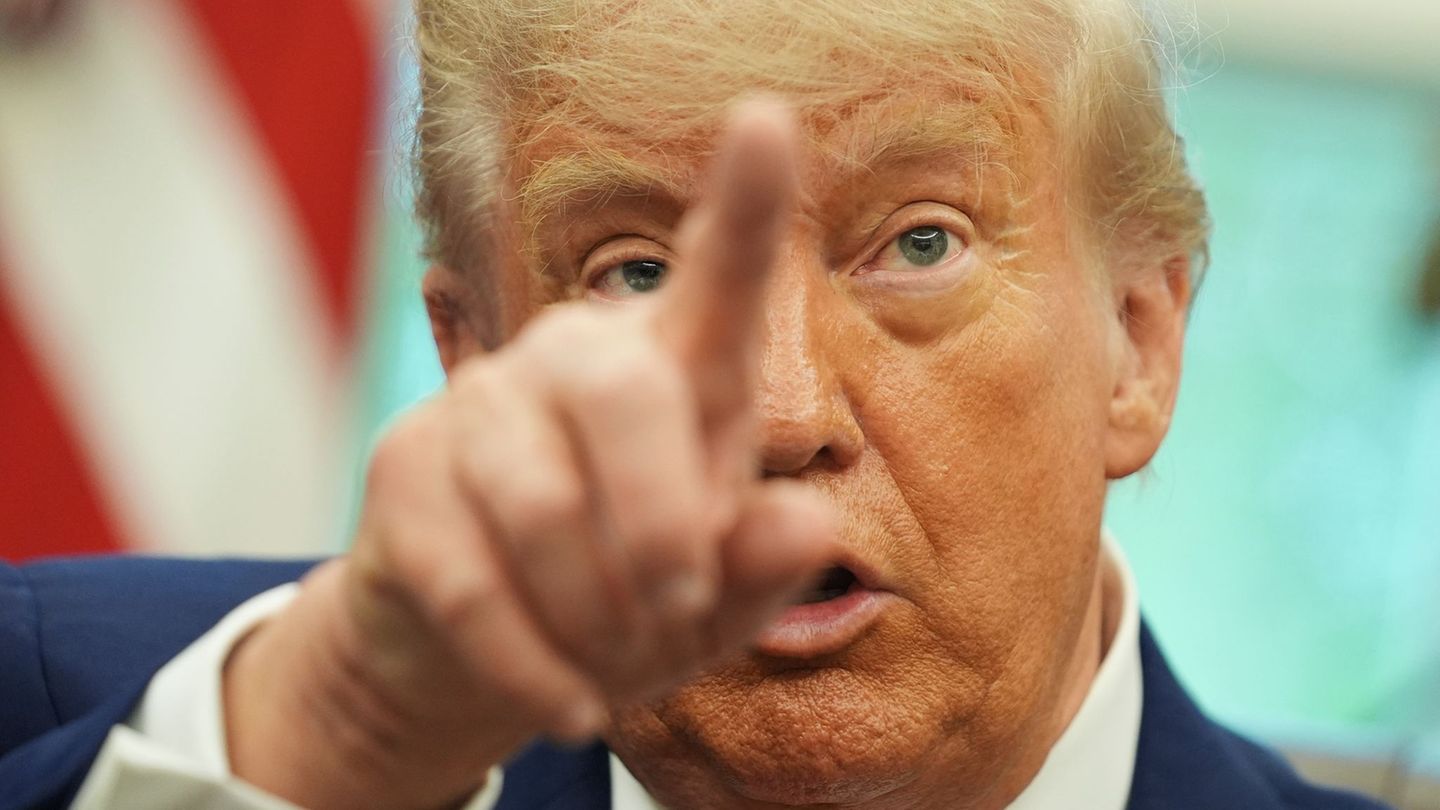After Solingen, the CDU leader senses Olaf Scholz’s weakness. He is pushing the Chancellor, aiming to break the traffic light coalition and, of course, the state elections. How will the Social Democrat react?
If there was still a need for an image to illustrate the distance between the Chancellor and the German people, the market square in Jena provided it on Tuesday afternoon. Olaf Scholz is not even responsible for it, but rather security level 1.
The area around the stage is hermetically sealed with black foil, barriers separate politicians, voters and the media from each other, there are more barriers all around, and police officers are standing around everywhere. Closeness to the citizens definitely looks different.
But at least around 600 people came to the SPD rally. It is 4:37 p.m. when Olaf Scholz steps onto the stage, wearing a white shirt and grey suit trousers. “Good day,” he says. While shouts of “Get lost!” ring out from further behind, Scholz is in Solingen within seconds.
“Attack on our freedom”
This will not only be a speech before the highly politically charged state elections in Thuringia on September 1st. It will also be a ten-minute response to Friedrich Merz.
“We will never accept this attack on our freedom, on our democracy,” says Scholz. “We will do everything we can to fight such Islamist terrorists.” For the suspected murderers, the following applies: “Anyone who does something like this has forfeited the right to protection.”
Scholz is once again playing the red sheriff: uncompromising, tough. But since the knife attack that left three dead and eight injured – presumably by a Syrian with Islamist motives – this image has been badly damaged. Is Scholz just a chancellor who makes announcements? This impression threatens to stick with him. This is also due to the actions of the opposition leader, who senses the chancellor’s weakness.
Friedrich Merz: “This is also my Chancellor”
CDU leader Merz clearly sees migration policy as an issue with which he can put Scholz in a difficult position. After all, the head of government had announced deportations “on a large scale” and declared the containment of irregular migration a top priority – and thus closely linked it to his chancellorship.
At 11:37 a.m., just about an hour after a long-arranged meeting between the CDU leader and Scholz in the Berlin Chancellery, the capital’s press received an invitation: Merz wanted to comment on the consequences of Solingen in the early afternoon. Again?
Already at the weekend, the opposition leader had called for some far-reaching consequences from the murderous knife attack in Solingen in his weekly email newsletter (“MerzMail”), such as a stop to the admission of refugees from Syria and Afghanistan. “Enough!”, Merz said indignantly, calling the Chancellor to account on Tuesday afternoon. With a poisonous offer.
“If we pull together, the CDU/CSU and the SPD, then we won’t need the FDP or the Greens,” said Merz in Berlin. In doing so, he is indirectly calling on Scholz to break up the traffic light coalition in order to quickly make “necessary” decisions on migration policy with the CDU/CSU. Merz lists the following measures: changing the right of residence, strengthening internal border controls, and giving the federal police more powers. Together, they would have a clear majority for this, he said.
Merz is determined. “It’s not possible is not an argument that I accept anymore,” he says. “Then it has to be made feasible.” Parliament could draw up initial measures as early as the beginning of September, in the first week of sessions after the summer break. The Chancellor listened to this in a one-on-one conversation in the morning, reports Merz, and promised to think about it. Scholz did not agree. Strange…
The CDU chairman is going on the offensive. Because for him too, a lot is at stake these days, perhaps even everything. For Chancellor Scholz, the state elections in Thuringia and Saxony and later in Brandenburg are the early final of his career. For Merz, they are the last hurdle to what he has been striving for for years: the Union’s candidacy for chancellor.
In theory, the conditions are good for Merz. The traffic light coalition appears to be in disarray and is now virtually incapable of taking action. The budget, which was actually intended to be a compulsory exercise, became a real test for the traffic light coalition. After Scholz had to intervene personally so that at least key data could be presented before the summer break, the dispute began again during the holidays. Even SPD leader Saskia Esken described the chaos in the traffic light coalition as “hard to bear”.
This is where Merz is now taking action – although he doesn’t want it to look like a strategy. The opposition leader has repeatedly stressed to the capital’s press that his offer is not a political maneuver, especially so close to the state elections. Perhaps he is doing this once too often.
Because of course Merz also wants to humiliate Scholz. The desired message: The Chancellor and his coalition are hesitating and procrastinating, and do not have the strength to make the necessary decisions – the Union, on the other hand, is tackling the problem.
“The Chancellor is now losing control of his own country,” says Merz. I am not only the leader of the opposition, I am also a citizen of this country. The Chancellor is also my Chancellor, even though I did not vote for him.” Due to its long period in government, the Union is not uninvolved in the current situation, but wants to accept its political responsibility.
The question that should resonate here is: Scholz too?
Scholz in the SPD relegation battle
In Jena, Scholz defended his policies and emphasized the successes of the traffic light coalition. Scholz did not have to name the opposition leader. It was already clear who he was referring to. “There are those who are quick to say things,” said Scholz. But: “Everyone can rely on us working hard to put this intention into practice.” That is his “will as Chancellor.”
Scholz does not accept criticism, however. “We have acted,” he says. The traffic light coalition has managed “with a lot of laws” to reduce irregular migration and increase the number of deportations by almost a third. Nevertheless, he says, we cannot sit back and do nothing about it. “And that is why it is right for the opposition leader in the German Bundestag to offer cooperation in reducing irregular migration.”
It is just as much a tactical counter-offer to Merz, as Scholz makes a reservation: “But it is just as right that we do this in accordance with the principles that are important for democracy and the way in which we shape this country together.” International treaties, the rules of the European Union and the Basic Law apply. Beyond that, “practical suggestions are welcome.”
It is a dig at Merz, who had drawn a lot of criticism for his demand to impose a kind of ban on accepting refugees from Syria and Afghanistan. The SPD is talking about “slogans” and even “populism”. In fact, such a plan would be associated with major legal difficulties, at least. Merz defends the idea, but admits that there is still a need for clarification. The main thing is to talk about it! That is easier to say as the leader of the opposition.
Scholz says: “The government and the opposition are always well advised to work together, not across each other, but with each other. And that is why it is important that there is a willingness to do so.”
Finally, after a detour via the Ukraine war, the Chancellor finally finds his way to Thuringia in Jena. And his battered SPD. The party here – similar to its neighbouring state of Saxony – is hovering dangerously close to the 5 per cent hurdle and could be thrown out of parliament for the first time in the history of the Federal Republic.
A complicated balancing act for Merz
Only the Social Democrats, Scholz shouts across the market square, can ensure that Thuringia is “properly governed”. What he means: According to the polls, the only realistic majority option is a coalition of the CDU and BSW – led by the Union.
But the situation in Thuringia is also extremely dangerous for Merz. The state, where it is notoriously difficult to form majorities, could even cost him a nomination that is actually certain. Distinguishing himself from the AfD while simultaneously cooperating with the Left Party spin-off BSW will be an extremely complicated balancing act. Moreover, nothing is traditionally politically predictable in Erfurt.
This Sunday will therefore not only decide what will happen next for Thuringia or Saxony – but also for Scholz and Merz.
Source: Stern
I have been working in the news industry for over 6 years, first as a reporter and now as an editor. I have covered politics extensively, and my work has appeared in major newspapers and online news outlets around the world. In addition to my writing, I also contribute regularly to 24 Hours World.




